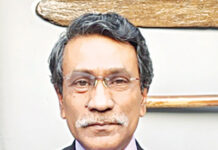Awami League’s moment of reckoning

Seeking clarity amidst chaos is something that most human beings do. But seeking chaos amidst clarity is a prerogative of the politicians. In Bangladesh’s tumultuous political landscape, where nothing is as it seems and no one is as they project themselves to be, there was a reassuring nod to this tradition when the Awami League government launched its “anti-corruption” drive recently, targeting errant elements within the AL Extended Universe. But it brought with it its own set of peculiarities: no one, apparently, knows who is seeking what, nor is there a tidy moral to this story.
It’s no secret that the central leaders of Awami League have often criticised unruly party members for giving it a bad rap and vowed to take tough action against them. And now they have made it official, having green-lit a number of crackdowns on clubs housing illegal casinos since September 18, when the current drive began. Earlier, following mounting allegations of extortion, tender manipulation, illegal drug trade and other criminal activities against Chhatra League, its president and general secretary were removed from their posts. Since then, a number of leaders and activists associated with Awami League, Jubo League and Krishak League have been arrested. The last one to fall under the anti-graft dragnet is Ismail Hossain Samrat, president of Jubo League’s Dhaka South unit and also an alleged casino kingpin. Samrat was arrested from Cumilla on October 6, and expelled from the organisation soon after.
So there it is: a loud and clear message from Awami League, honouring its pledge to the people about uprooting corruption, walking the talk on cleaning up malfeasance within party ranks, and removing barriers (“or termites”, as the prime minister has called them) to its ongoing project of development.
Or maybe it is this: a half-hearted attempt at appeasing an increasingly disaffected public, an opera-buffa parody “full of sound and fury, signifying nothing”—nothing of lasting value, that is. In other words, to believe in the potential of this drive to bring real change is to mistake superficiality for profundity.
However you view it, we must acknowledge that the government’s anti-corruption drive has been able to elicit a certain bit of approval and even admiration from a cross-section of the public. But it doesn’t make it any less difficult to ascertain what it is all about, where it is headed, and to what end. For the public to navigate these complexities and reach clarity is not easy, but do the real players even know what they are seeking?
On the face of it, the current drive is against corruption as it lives and breathes in our country, although so far it has had a markedly narrow focus: mostly on mid-level leaders with a chequered public reputation from Awami League’s affiliated organisations. And it gets further narrower when “hybrids” and “infiltrators”—defectors from other parties—are especially singled out, as some top leaders have done. The message we get from these discrepancies is that the drive is neither just against corruption nor nearly as inclusive and objectively-thought-out as one would expect.
Such drives, according to Prof Ali Riaz of the political science department at Illinois State University, are not uncommon in the history of Bangladesh. In an article in Prothom Alo, he pointed out that since the liberation of Bangladesh, ruling parties, sometimes even opposition parties, have toyed with the idea of a purge within their party apparatuses. Anti-corruption efforts have been on the agenda of successive governments. The current government drew on this long, if unremarkable, tradition to design its anti-graft purge. But what can it possibly expect to achieve through this exercise? Nothing substantive, in my opinion, even going by Awami League’s narrow objective to “rid itself of tainted blood” and “brighten its image” once again—to quote General Secretary Obaidul Quader, who made the remarks on September 30 while urging a partisan crowd to help the party in its mission.
Quader’s statement and other similar remarks betray a sense of unease festering within the party about the recklessness of a section of leaders and activists following the 2019 national election, which brought it back to power for a record third consecutive term. But since it can’t axe them all, it’s taking middle of the road, going only after those who are expendable, with the expectation that others will get the hint and fall in line. This middle-of-the-road approach is to be expected given how the subject of reform is approached in Bangladesh, where no change or reform initiative is usually undertaken until it gets “embarrassing” for the government. And that’s about it—“embarrassing”, the one condition that can move files or land a criminal in jail at dizzying speed, or remove otherwise insurmountable barriers.
Unfortunately for Awami League, its anti-corruption drive shines a harsh light on its own inner workings: it exposes the extent to which corruption has spread within the party apparatuses—not that it needed anymore exposing—and ironically, by repeatedly defending the need for such a drive, it has confirmed the allegation that corruption of a troubling scale does exist within the party. But despite what its policymakers think, Awami League’s current image crisis has less to do with the activities of some errant party members, and more to do with the distrust and lack of credibility it has created through its failure to establish the rule of law and ensure transparency and accountability in vital public institutions—the source of all public sufferings.
There is a term that can describe what is really happening here: abuse of power. It’s pervasive, and it’s not done just behind closed doors. It comes in all forms of wickedness, often in broad daylight, and is indulged because it helps sustain the deeply politicised governance system in Bangladesh. In the end, it’s the system and its champions that matter. Anyone or anything else is expendable.
In the anti-graft tradition of China, the preferred nomenclature for the expendables is: “flies”. One may recall that, while launching a campaign in 2012 to purge corrupt elements of the government of the Communist Party of China, President Xi Jinping had memorably mentioned “tigers and flies”, meaning high-profile leaders and officials and those of lower standing. The Chinese government has gone after both groups, with mixed successes, and whatever the legal basis or eventual fallout of this campaign is, it has at least proved one thing: that making arbitrary arrests and convictions, temporarily effective as they maybe, cannot bring a lasting system-wide change.
Bangladesh knows this too well. In recent years, the government has launched several high-octane operations including last year’s anti-narcotics drive. After the anti-narcotics drive was launched, many alleged drug dealers and peddlers were killed, many more were arrested, and many surrendered on their own or left the country. All, as it turns out, to no avail. Drugs keep pouring in the country today.
These issue-specific law enforcement campaigns have failed to deliver for the simple reason that those were centred on individual criminals rather than the corrupt system which breeds them, and which is exactly what needs to be dismantled for the kind of change we desire. The government remains high on rhetoric on these drives but low, even silent, on their effects (or lack thereof). The current drive too will probably end—it’s going to end one day, right?—in the same way and meet the same frustrating end.
That holds true even if the drive, in the unlikely event that Awami League goes for a wider intraparty reform, manages to catch a few “tigers”—for example, ministers, MPs, high-ranking leaders, top executives (past or present) who have a proven track record of crimes and corruption. Even then, the drive will fail to create ripples beyond a certain point, for the same reason as stated above.
Corruption is a systemic problem and so any effort to combat it should be systemic too, which means being guided by a clear vision, a well-defined modus operandi and of course a legal framework to ensure its durability. This is no easy task for Awami League, or any other political party in Bangladesh for that matter, where internal democracy and accountability have been frequent casualties. Going through an unprecedented third term in office, Awami League finds itself in uncharted territory—too big to handle, too cumbersome to make progress, and too powerful for its own good. Only it can decide how and which way to go from here on. And decide it must, and decide well, for the future of the country as well as its own depend on it.
Badiuzzaman Bay is a member of the editorial team at The Daily Star. Email: badiuzzaman.bd@gmail.com









